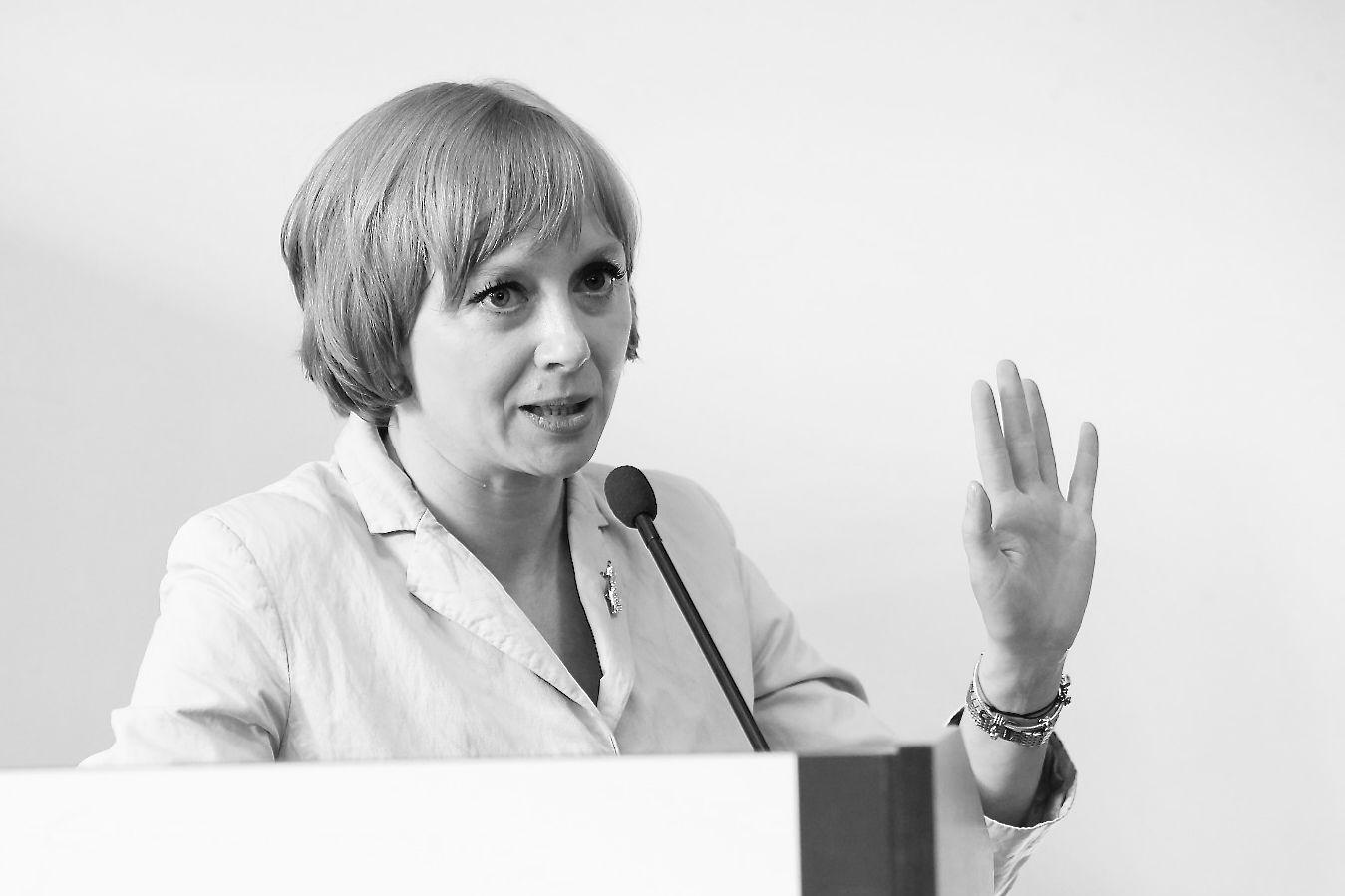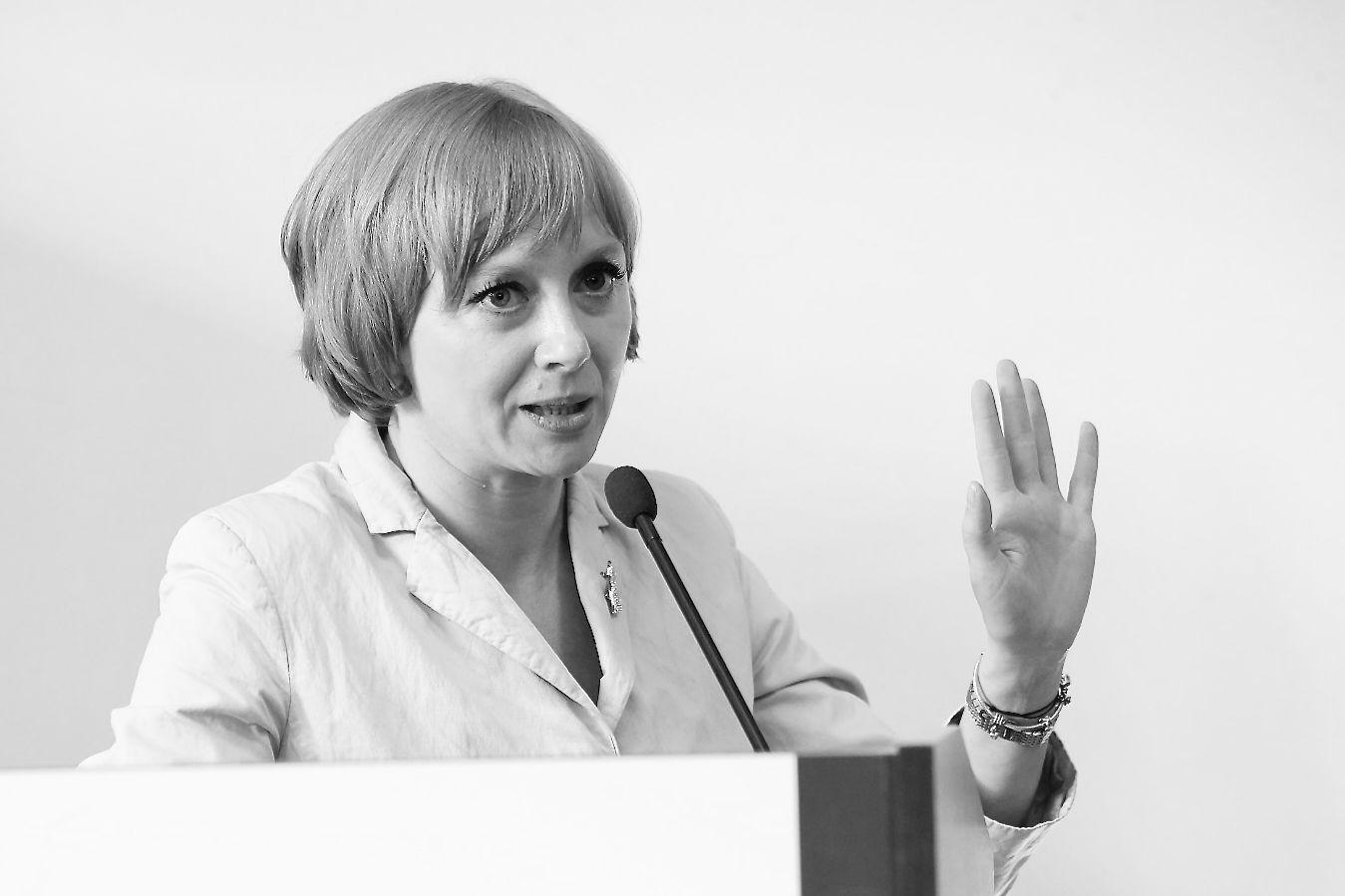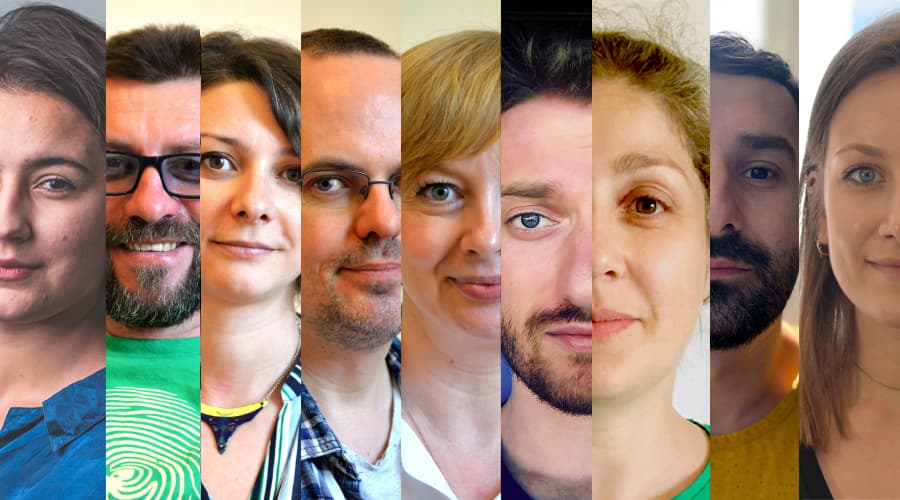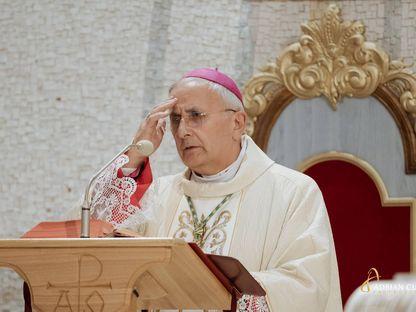
Since 2015, Emilia Șercan has been publishing journalistic investigations about plagiarists who hold key positions in the police, the army, the justice system, in intelligence services, the Government, and Parliament on online platform PressOne.

Since 2015, Emilia Șercan has been publishing journalistic investigations about plagiarists who hold key positions in the police, the army, the justice system, in intelligence services, the Government, and Parliament on online platform PressOne.
Emilia Șercan: “State authorities have orchestrated a kompromat operation against me. Now they’re trying to cover it up."
English Section
04/04/2022
This text is not about my private life.
This text is about the way in which an investigative journalist is being threatened, harassed, intimidated and discredited - not by representatives of organized crime groups, but with the intercession and complicity of Romanian state officials!
I have decided to publicly denounce the defamation and intimidation operations to which I have been subjected following January 18, 2022, the day I revealed that Romanian PM Nicolae Ciucă’s PhD thesis was plagiarized.
I have made this decision because this time the key player is the Romanian state itself: a piece of evidence I provided to the Romanian Police, with the end goal of identifying someone who had perpetrated a violation of privacy, was leaked from the criminal file that very same day and became the basis of an extensive kompromat operation.
I gave criminal investigation bodies enough time to investigate the information leak that I denounced on February 18, 2022.
For 45 days, I haven’t even been heard in the case opened on the basis of my complaint that denounced the leak.
In these circumstances, I have decided to publicly speak out both against the intimidation operation targeting me, as well as against a parallel operation of concealing the information leak, with the complicity of leaders of certain institutions responsible for ensuring my protection, both as a citizen and as a journalist.
Mulți ne citesc, puțini ne susțin. Fără ajutorul tău, nu putem continua să scriem astfel de articole. Cu doar 5 euro pe lună ne poți ajuta mai mult decât crezi și poți face diferența chiar acum!
This is the only way to defend myself and the work I’ve done as an investigative journalist, over the past seven years, in order to uncover the corrupt system of Romania’s militarized universities, the plagiarists planted in key positions within the police, the military, the justice system, intelligence services, the Government, the Parliament - and, last but not least, the corrupt system through which those at the helm of the education system have been shielding plagiarists for a decade now.
It should be noted that I have already notified both the international forums for the protection of journalists against abuse committed by the authorities, as well as the diplomatic missions of EU countries and the US.
***
Within the course of a single month, I was targeted by three separate acts of threat, defamation, and intimidation - all related to my work as an investigative journalist. According to the evidence in my possession, one of the defamation and intimidation acts was carried out with the complicity of certain state institution employees.
The first of the three actions took place on January 19, 2022, one day after I revealed that the Romanian Prime Minister Nicolae Ciucă had plagiarized his PhD thesis.
Predator in Robes: The Diocese of Iași and the Vatican Buried a Sexual Assault Committed by a Catholic Priest Against a Minor in Bacău, Failing to Alert Prosecutors
A Roman Catholic priest abused a 13-year-old girl in the parish where he served in Bacău County: the bishop of Iași knew about it, sent the case to the Vatican, and applied canonical sanctions, but did not notify the authorities, who only intervened later and sentenced him to prison.
For each of these three actions of threat and denigration I have already filed criminal complaints with the Bucharest Police Criminal Investigation Service. The criminal cases are currently being investigated under the supervision of the Prosecutor's Office attached to the Bucharest District 4 Court, the Prosecutor's Office attached to the Bucharest Tribunal and the Prosecutor's Office attached to the Bucharest Court of Appeals.
***
On January 19, 2022, the day after I published the investigation proving Prime Minister Nicolae Ciucă’s (PNL) plagiarism, I received a threatening message. The content of the message is directly linked to the article on the PM’s plagiarism. The following day, I filed a criminal complaint with the Bucharest Police Criminal Investigation Service.
Un newsletter pentru cititori curioși și inteligenți.
Sunt curios
On February 2, 2022, I received another threat, for which I filed a second criminal complaint.
On the evening of February 16, 2022, I found a Facebook message, from someone with whom I am not connected through the social network and whom I do not know, which relayed five personal photos, taken roughly 20 years ago by my fiancé at that time, in the apartment where we lived together.
In the photos, I am seen at a restaurant in the mountains, as well as in ordinary poses that have to do with the daily routine of anyone in their own home, in the bathroom, after the shower, scantily clothed.
***
On the evening of February 16, 2022, I was shocked to learn that an unknown person was in possession of personal photos of me. That same evening, my shock further increased as I discovered those photos to have been uploaded to several foreign adult websites.
After analyzing the situation, I realized that my photos had been stolen from an electronic device and then uploaded to those platforms. I never sent those photos to anyone, nor did I ever upload them to those accounts. I do not own accounts on such sites and I do not access such platforms.
At 8:45 p.m., on February 16, I took a screenshot of the message received on Facebook Messenger, in order to have proof that someone had sent me those photos.
The next morning, February 17, I called the police deputy commissioner who was already in charge of the two prior threats, and asked her if the crimes resulting from the theft of those photos and their uploading to adult sites were within the competence of the Criminal Investigation Department. Her answer was affirmative and she told me she was waiting for me at the office to file a new criminal complaint - the third one in under a month.
After we ended our conversation, the deputy commissioner sent me a WhatsApp message asking me for the name of the account that had sent me the message in question. In response, also via WhatsApp, at 10:29 a.m. I sent her the screenshot I had taken the night before, at 8:45 p.m., which displayed both the person's name, as well as the messages and photos I had received from them.
One and a half hours later, I arrived at the Criminal Investigation Service, where I filed a new criminal complaint regarding the theft of the five photos and their publication on adult websites. The screenshot was printed by the deputy police commissioner, who had already received it from me via WhatsApp, and was submitted as evidence in the criminal case.
I left the Criminal Investigation Service on Thursday, February 17, 2022, at 2:10 p.m.
The following morning, on February 18, a Google alert notified me that the screenshot, which I had submitted as evidence in a criminal case, and my stolen personal photos had been posted to a website registered in the Republic of Moldova.
The screenshot published by the Moldovan website shows both the time when I took the screenshot with my personal phone, the night before I submitted it to the police, as well as the name of my cell phone provider and battery status at that moment.
At the time I left the police station, that screenshot was only hosted in two places: on my personal phone and on the phone of the deputy police commissioner, to whom I had provided it as evidence in the file opened following the criminal complaint I had registered with the Police on the day before.
The metadata of the text published on the Moldovan website indicates that that screenshot was published on February 17, 2022, at 2:51 p.m., approximately 40 minutes after I had left the headquarters of the Criminal Investigation Service.
Subsequent internet searches revealed that a total of 74 sites went on to publish articles that were identical in terms of text and layout on the afternoon of February 17. They all included direct or indirect links to the article on the Moldovan website that featured the screenshot.
Shocked to learn that my screenshot, a piece of evidence in a criminal case, had been published online on the very day I filed the complaint, I contacted Lucian Bode, Minister of Internal Affairs, whom I know by the nature of my job as a journalist.
I told him that a piece of evidence in a criminal case had been leaked to the press by the police and thus became the cornerstone of a large-scale kompromat operation. Minister Bode assured me that the Romanian Police will carry out an internal investigation regarding the information leak I was denouncing.
On that same day, February 18, Minister Lucian Bode facilitated a meeting between myself and the head of the Romanian Police, Police Quaestor Benone Matei, who assured me that the Romanian Police would do everything in its powers to discover the circumstances through which the screenshot wound up on a Moldovan website.
At that time, I also filed another criminal complaint with the Internal Control Department of the General Inspectorate of the Romanian Police for leaking information from a criminal investigation, as well as for a violation of privacy.
***
On Monday, February 21, the head of the Romanian Police, Police Quaestor Benone Matei, presented me with an alleged analysis of the way in which the screenshot and my stolen photos were spread on the internet.
He showed me the copy of an article, which he indicated as „source zero” - allegedly the first one to have published on the internet both my personal photos, as well as the screenshot that I had submitted as evidence in the file.
The alleged „source zero” indicated by the head of the Romanian Police was another website registered in the Republic of Moldova. According to the metadata presented to me by the head of the Police, it had published the screenshot and five pictures on February 17, at 5:45 a.m., i.e., more than four hours before I had sent the screenshot to the deputy commissioner of the Criminal Investigation Service and even before I had gone to the police to file a complaint.
Should the information presented to me by the Chief of Police have checked out, the state authorities - the same ones suspected then, and still suspected now, of leaking information from a criminal investigation file - would have been cleared of any and all suspicions.
During our February 21 conversation, the head of the Romanian Police also hinted at the possibility that my mobile phone had been hacked - in other words, that my screenshot had, in fact, been lifted from my own phone.
He failed to inform me whether the Romanian Police would launch an investigation to identify those who had illegally spied on a journalist.
After a cursory internet check, I discovered that the website indicated by the head of the Romanian Police as "source zero" had posted another article at 5:35 a.m. - that is, ten minutes before the publication of my photos. This was a copy-paste lift, links included, of a news item that Digi24.ro had published at 5:30 p.m. on that same day - i.e., 12 hours later, according to the time registered on the website.
The article allegedly published at 5:35 a.m. by the Moldovan website, which the Romanian Police considered "source zero," was reporting events that had not yet occurred at 5:35 a.m.!
The article in question relayed a series of statements by Sergei Lavrov, the Russian Federation’s Minister of Foreign Affairs, which he had made in a press conference that took place eight hours after that article was published.
How can you relay something at 5:35 a.m., which is only going to happen eight hours later?
How can you, at 5:35 a.m., make a verbatim copy of an article that would only be published twelve hours later?
All these clues point to the fact that the article presented to me by Quaestor Benone Matei, head of the Romanian Police, as „source zero,” was not the first to publish the screenshot I had submitted as evidence in my criminal complaint.
Moreover, the article deemed to be „source zero” by the head of the Romanian Police was not republished with a link by any other website.
On the other hand, the article I consider to be „source zero,” published on February 17, at 2:51 p.m., was republished and linked by 74 other websites within less than three hours.
In addition, the photos stolen from me had been uploaded to adult websites in September 2021.
How come no one exploited these pictures in a kompromat operation from September 2021 until February 17, 2022, after I accidentally found out about their existence and went to the police to report them stolen and my privacy violated?
How can the Romanian Police explain the fact that these pictures appeared publicly only after I filed a criminal complaint, accompanied by a screenshot that proved they were in the possession of an unauthorized person?
How can the Romanian Police explain the publication of a screenshot that was only stored on my phone and on the phone of the deputy commissioner who dealt with the registration of the criminal complaint in which I reported the photos stolen and my privacy violated?
***
Since I also took into account the possibility that my cell phone had been hacked, I requested independent expertise reports from three international institutions that specialize in detecting cybersecurity breaches, including evidence of spying and hacking: Amnesty Tech, a division of Amnesty International that specializes in investigating digital attacks on representatives of civil society and the media; Citizen Lab, a lab specializing in cybersecurity and human rights at the University of Toronto (Canada); and Bitdefender, one of the global leaders in cybersecurity solutions.
According to the three institutions’ experts, no evidence of spyware or hacking that would have led to the theft of my screenshot was discovered on my phone within the 18 hour window from when it was taken (February 16, 8:45 p.m.) to when it was published (February 17, 2:51 p.m.).
Although the Interior Minister and the head of the Romanian Police assured me they would initiate an internal investigation of the Criminal Investigation Service, to find out who had leaked that screenshot to the press - but also to learn who had uploaded my pictures to several adult websites, with the obvious purpose of compromising me - thus far I have no indication that such an investigation ever really took place.
For nearly three weeks, Romanian state authorities - the Police and the Prosecutor's Office - refused to even inform me of the registration number of the file opened as a result of my complaint about the leak of criminal case information.
It is now 45 days after filing the complaint and I have yet to receive access to the file; I have also never been called in for a hearing at the Prosecutor’s Office.
All these facts, which I can prove, speak to an attempt at covering up the screenshot leak to the press.
The proof that points to the subsequent fabrication of evidence, with the goal of covering up the screenshot leak in question, was presented to me by Quaestor Benone Matei, head of the Romanian Police.
Seeing as Romanian state institutions resorted to a whole set of tactics that delayed the investigation and tried to mislead me about the leak of information, I have already alerted local and international media organizations, European officials and foreign embassies in Romania regarding my situation.
Also, on March 9, 2022, I sent informative letters to Romanian President Klaus Iohannis, Prime Minister Nicolae Ciucă, Interior Minister Lucian Bode, Romanian Attorney General Gabriela Scutea, and Romanian Police Chief Benone Matei.
I thereby officially informed them that the Romanian state authorities are orchestrating actions meant to compromise me, as well as to cover up the kompromat operation, initiated shortly after I wrote about Prime Minister Nicolae Ciucă’s plagiarized PhD thesis. I also wrote to them about the fact that my complaints regarding a violation of privacy and information leakage are not being properly investigated.
In those letters, I provided information about the fact that the head of the Romanian Police, Benone Matei, presented me with fabricated data, which indicated that another site had allegedly published the screenshot and my photos before I filed my February 17 criminal complaint regarding a violation of privacy.
The day after I sent the letters, I found out that the website the head of the Romanian Police had deemed to be "source zero" - the one that had allegedly published the screenshot before it had come into the possession of the Police - had been completely deactivated. To press date, that website is still down.
***
Personally, I am very concerned and have legitimate suspicions, supported by multiple pieces of evidence, that state authorities are attempting to bury the leak of information from a criminal case targeting an investigative journalist, who was threatened with death in 2019, who became the target of yet another intimidation campaign.
I am horrified by the fact that a key piece of evidence from a criminal complaint, which I submitted to the Romanian Police for the purpose of requesting protection, was leaked by investigators, being published on the same day on a website registred outside Romania.
I am outraged by the perspective that Romanian authorities first orchestrated and then disguised an operation meant to discredit a journalist who, over the past seven years, has written about widespread academic corruption, about politicians, magistrates, police and intelligence officers who acquired their doctors’ titles through academic fraud.
I am well aware that investigative journalism is a risky job.
Over the course of my 25-year career, I have been repeatedly intimidated and harassed. However, the death threat I received in 2019 and the past denigration campaigns against me were not orchestrated by organized crime groups, but by senior police officers: a police quaestor and a chief commissioner - the rector of the Police Academy, Adrian Iacob, and vice-rector Mihail Marcoci, respectively - as a Romanian court already established in 2021.
The new threats I have received since January 2022, as well as the leaking of evidence from a criminal case, are further attempts to silence me and force me into abandoning my work.
The investigative bodies’ passive attitude is all the more alarming as the threats began the day after I published an article that proved Prime Minister Nicolae Ciucă’s plagiarism. They continued with acts of intimidation and denigration that are unspeakable for an EU member country, one that allegedly subscribes to rule of law values.
The 2019 death threats against me, planned by the rector and vice-rector of the Police Academy, were promptly investigated by the Romanian Police and the National Anticorruption Directorate. The two were identified, investigated and charged within just two months. Yet, this time, in the six weeks since I filed the criminal complaint, I have not even been interrogated as the plaintiff.
I firmly believe that my investigations into academic corruption have contributed to slow, yet vital reforms. These include the 2018 clean-up of the Romanian National Intelligence Service Academy and the mass plagiarism-triggered shutdown of the two doctoral schools within the Police Academy that took place in the 2020-2021 university year.
I also strongly believe that investigative journalism is a critical element in the process of transforming Romania. Romanian journalists should be trust that Romanian state authorities will address threats and attempts at intimidation against them professionally, with a maximum of competence.
However, I have good reason to believe that my safety is currently jeopardized. Even if I filed criminal complaints with the Romanian Police, 45 days later, I do not have a single indication that the Police and the Prosecutor's Office are correctly and promptly investigating the criminal complaints through which I decried being the target of an intimidation and denigration campaign.
WARNING
I am hereby publicly warning that not for one second will I hesitate to file further criminal complaints against any private or legal person, based in Romania or abroad, who, without my consent, will broadcast, present, or share any of the stolen photos.
According to art. 226, para. 2 of the Romanian Criminal Code: „The rightless disclosure, dissemination, presentation, or sharing of sounds, conversations, or images described in para. (1) to another person or to the public, shall be punished with 3 months’ to 2 years’ imprisonment, or with a fine.”
Translated by Ioana Pelehatăi

Avem nevoie de ajutorul tău!
Mulți ne citesc, puțini ne susțin. Asta e realitatea. Dar jurnalismul independent și de serviciu public nu se face cu aer, nici cu încurajări, și mai ales nici cu bani de la partide, politicieni sau industriile care creează dependență. Se face, în primul rând, cu bani de la cititori, adică de cei care sunt informați corect, cu mari eforturi, de puținii jurnaliști corecți care au mai rămas în România.
De aceea, este vital pentru noi să fim susținuți de cititorii noștri.
Dacă ne susții cu o sumă mică pe lună sau prin redirecționarea a 3.5% din impozitul tău pe venit, noi vom putea să-ți oferim în continuare jurnalism independent, onest, care merge în profunzime, să ne continuăm lupta contra corupției, plagiatelor, dezinformării, poluării, să facem reportaje imersive despre România reală și să scriem despre oamenii care o transformă în bine. Să dăm zgomotul la o parte și să-ți arătăm ce merită cu adevărat știut din ce se întâmplă în jur.
Ne poți ajuta chiar acum. Orice sumă contează, dar faptul că devii și rămâi abonat PressOne face toată diferența. Poți folosi direct caseta de mai jos sau accesa pagina Susține pentru alte modalități în care ne poți sprijini.
Vrei să ne ajuți? Orice sumă contează.
Share this


